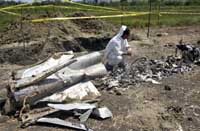Georgia accuses Russia of dropping missile - 8 August, 2007
Georgia said Wednesday it has proof that Russian jets violated its airspace and released a missile that landed near a house. Russia has denied the claim.

Georgia's Foreign Ministry issued a formal protest, calling the intrusion and firing of the missile "undisguised aggression and a gross violation of sovereignty of the country."
"This was a provocation aimed only at one thing, at disrupting the peace in Georgia, which would cause panic in society and ultimately change the political course of the country," Georgia's President Mikhail Saakashvili said Tuesday at the site.
The Georgian Foreign Ministry said Wednesday that radar records compatible with NATO standards showed that a Russian Su-24 jet had flown from Russia into Georgia and launched a missile, which did not explode.
Investigators identified the weapon as the Russian-made Raduga Kh-58 missile designed to hit radars, the ministry said. The missile, code-named by NATO as AS-11, carried a warhead of 140-kilogram (over 300 pounds) of TNT, it said.
Russia's air force has flatly denied that its planes had crossed into Georgia's airspace.
Georgia has long accused Russia of trying to destabilize the country and of backing separatists in its breakaway regions of Abkhazia and South Ossetia, which Saakashvili has pledged to bring back under central government control.
The Gori region, where the missile was dropped, is next to South Ossetia.
Gen. Marat Kulakhmetov, commander of Russian peacekeepers patrolling South Ossetia, said an unidentified aircraft dropped the missile after flying over South Ossetia and coming under fire from the ground. Kulakhmetov suggested the plane came from Georgia.
Boris Chochiyev, a deputy prime minister in South Ossetia's separatist government, accused Georgia of dropping the missile.
The Georgian Foreign Ministry emphasized Wednesday that the nation doesn't have Su-24 jets or missiles of that type.
Relations between Russia and Georgia have been strained ever since Saakashvili was elected president in early 2004 and made clear his intentions to move the former Soviet republic closer to the West and join NATO.
Georgia has accused Russia of backing separatists, while Moscow, in turn, has accused Tbilisi of fomenting tensions around rebel provinces. It has repeatedly accused Russia of violating its airspace - claims Russia has invariably denied.
Earlier this year, Georgia said Russian helicopters fired on its territory in the Kodori Gorge, a volatile area on the fringes of breakaway Abkhazia. A subsequent report by the U.N. observer mission in Georgia last month said it was not clear who fired at the Georgian territory.
At the United Nations, spokesman Farhan Haq said the world body had no firsthand information on the situation, and noted that the U.N. mission in Georgia was limited to the Abkhazian conflict, not that in South Ossetia.
The U.S. State Department on Tuesday condemned the attack, but said it was too early to say who might have been behind it.
"What we do know is that there was an attack on Georgia and we absolutely condemn any attack on Georgia," said Matt Bryza, the deputy assistant secretary of state for European affairs who specializes in the region. "We firmly support Georgia's sovereignty and territorial integrity."
He called for Russia to drop objections to two key confidence-building measures recommended by the Organization for Security and Cooperation in Europe (OSCE) designed to ease tensions: doubling from 12 to 24 the number of OSCE military observers in South Ossetia and the installation of a new radar tracking system to monitor overflights.
"What this (latest incident) shows is that there is a danger this conflict could escalate unless the Russians agree," Bryza said.
Subscribe to Pravda.Ru Telegram channel, Facebook, RSS!





